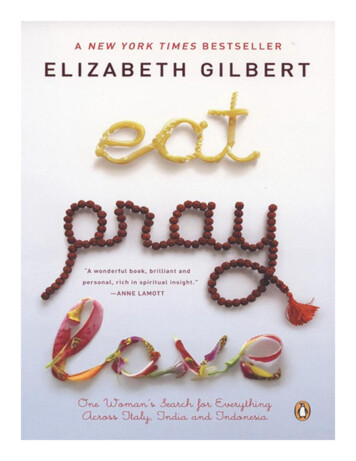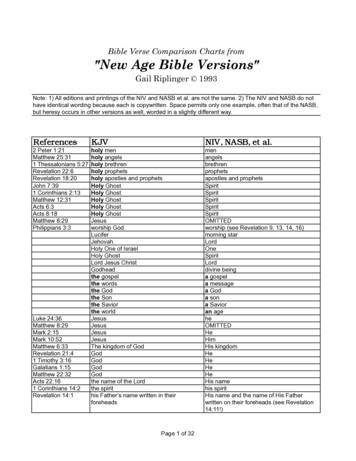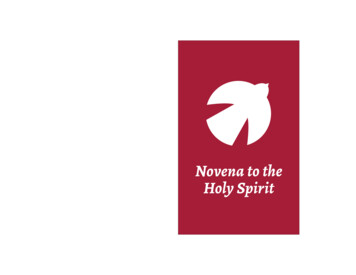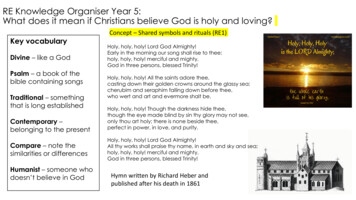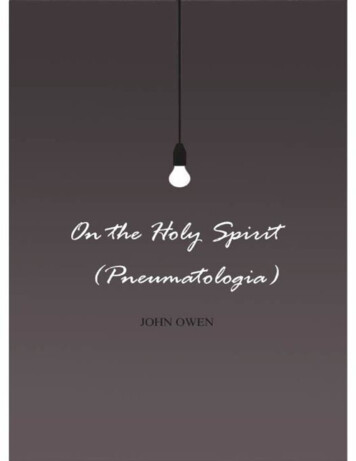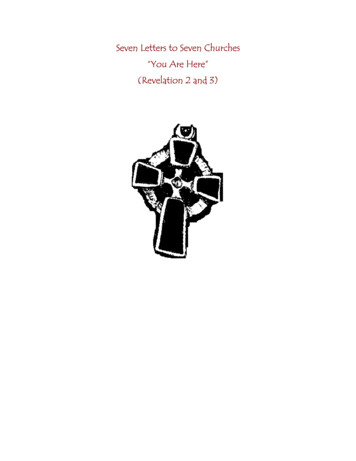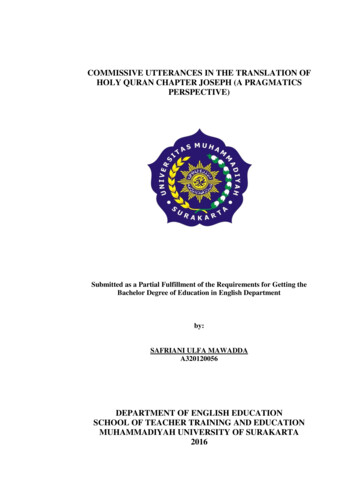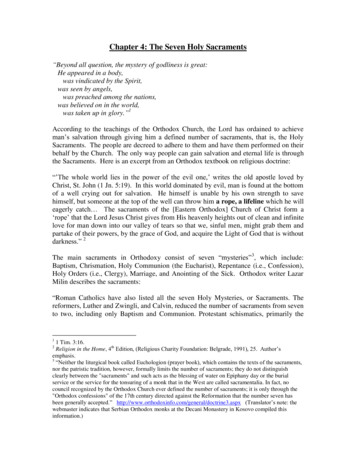
Transcription
Chapter 4: The Seven Holy Sacraments“Beyond all question, the mystery of godliness is great:He appeared in a body,was vindicated by the Spirit,was seen by angels,was preached among the nations,was believed on in the world,was taken up in glory.”1According to the teachings of the Orthodox Church, the Lord has ordained to achieveman’s salvation through giving him a defined number of sacraments, that is, the HolySacraments. The people are decreed to adhere to them and have them performed on theirbehalf by the Church. The only way people can gain salvation and eternal life is throughthe Sacraments. Here is an excerpt from an Orthodox textbook on religious doctrine:“’The whole world lies in the power of the evil one,’ writes the old apostle loved byChrist, St. John (1 Jn. 5:19). In this world dominated by evil, man is found at the bottomof a well crying out for salvation. He himself is unable by his own strength to savehimself, but someone at the top of the well can throw him a rope, a lifeline which he willeagerly catch The sacraments of the [Eastern Orthodox] Church of Christ form a‘rope’ that the Lord Jesus Christ gives from His heavenly heights out of clean and infinitelove for man down into our valley of tears so that we, sinful men, might grab them andpartake of their powers, by the grace of God, and acquire the Light of God that is withoutdarkness.” 2The main sacraments in Orthodoxy consist of seven “mysteries”3, which include:Baptism, Chrismation, Holy Communion (the Eucharist), Repentance (i.e., Confession),Holy Orders (i.e., Clergy), Marriage, and Anointing of the Sick. Orthodox writer LazarMilin describes the sacraments:“Roman Catholics have also listed all the seven Holy Mysteries, or Sacraments. Thereformers, Luther and Zwingli, and Calvin, reduced the number of sacraments from sevento two, including only Baptism and Communion. Protestant schismatics, primarily the11 Tim. 3:16.Religion in the Home, 4th Edition, (Religious Charity Foundation: Belgrade, 1991), 25. Author’semphasis.3“Neither the liturgical book called Euchologion (prayer book), which contains the texts of the sacraments,nor the patristic tradition, however, formally limits the number of sacraments; they do not distinguishclearly between the "sacraments" and such acts as the blessing of water on Epiphany day or the burialservice or the service for the tonsuring of a monk that in the West are called sacramentalia. In fact, nocouncil recognized by the Orthodox Church ever defined the number of sacraments; it is only through the"Orthodox confessions" of the 17th century directed against the Reformation that the number seven hasbeen generally accepted.” http://www.orthodoxinfo.com/general/doctrine3.aspx (Translator’s note: thewebmaster indicates that Serbian Orthodox monks at the Decani Monastery in Kosovo compiled thisinformation.)2
Anabaptists, but soon others, deleted even these two sacraments by proclaiming themmerely sacred rites.” 4So, according to the Orthodox, both they themselves and Roman Catholics have the‘fullness of God’s grace’ because they both adhere to seven Sacraments, Protestantsadhere to only two, and the “schismatic” Protestants (those whom Milin calls evangelicalChristians in Serbia and the world) deny any sacramental acts as mentioned above.Before going further into details of explanations from the Holy Scriptures all the termsthat the Orthodox call “Holy Sacraments”, our readers ought to know that Orthodoxdoctrine of Holy Sacraments is not based on the Bible. Rather, Orthodoxy bases itsbeliefs on the Sacraments from Holy Tradition, e.g., the teaching and interpretation of theGospel by the Church Fathers over the centuries.The Origin of Teaching on the Seven Sacraments in the Eastern Orthodox ChurchAs anyone who studies the doctrines of the Eastern Orthodox Churches knows, differentteachers believed other sacraments existed in addition to the seven that are now officiallyrecognized. Such is the example of monastic tonsures (cutting the hair of initiates into lifein the monasteries).5 However, under the influence of Roman Catholic theology, theOrthodox Church adopted the number of seven Holy Sacraments. Ernst Benz says this:“Orthodoxy characteristically does not strictly adhere solely to seven as the number ofthe Sacraments in the Church. However, the theology of the Orthodox Churchlater came under the influence of the Roman Catholic Church and adopted thedefinition of Seven Sacraments identical to those of Rome. However, Orthodoxy doesnot recognize the principle of a strict distinction between the Sacraments andsacramentals, in other words, devotional acts of the church that are not sacraments in thetrue sense.” 6This author also confirms the fact presented by evangelical Christians (the so-called“Protestant schismatics”) that the doctrine of the Sacraments developed gradually overmany centuries, including various views by church authorities on their number. Thedogma of the “Sacraments” found in Eastern Orthodoxy and Roman Catholicismappeared only 1200 years after Christ's ascension into heaven:“In a certain way, the Church in its entire sphere of 'mysteries' brought out of itscharismatic fullness could always devise a new mystery. While the old church resolvedits acceptance of the books of the New Testament canon in the Fourth Century, itsestablishment of church dogmas in the Fifth and Sixth Centuries, and the simplificationof the church liturgy in the Seventh Century, the number of Sacraments had not yetbeen defined until the end of the first millennium. This always signified its creativeliveliness in this sphere.4Lazar Milin, The Church and Sects, 299.More about tonsure will be discussed in the chapter on Orthodox Monasticism.6The Spirit and Life of the Eastern Churches, 32. Author’s emphasis.5
One of the renowned teachers of the Orthodox Church, Pseudo-Dionysius the Areopagite(6th Century) listed six sacraments in his work The Ecclesiastical Hierarchy: baptism,Eucharist, confirmation, priesthood, the consecration of monks, and rites for the dead.Another teacher revered by Orthodoxy, John of Damascus, two centuries later mentionsonly two sacraments: Baptism together with the corresponding chrismation and theEucharist (Communion). Only during the Council of Lyons in 1274 did Greektheologians, who discussed the possibility of uniting with Rome, accepted thenumber of Sacraments to be seven, which is slightly before the West acceptedscholastic theology: Baptism, Confirmation (Confirmation), Eucharist, Penance,Priesthood, Marriage, and Anointing of the Sick. Even today there are many Orthodoxtheologians who do not hold strictly to the scheme of the seven ‘Sacraments’ establishedby the Roman Catholic Church. This discord indicates a much more comprehensiverange of Orthodox mystery.” 7St. John of Damascus was one of the most respected theologians in Orthodox history,particularly for his views on icon veneration. Yet, it is remarkable that even his view ofthe sacraments bears strong parallels to that of the Protestants. Like the Protestants, St.John only recognized two sacraments: baptism and the Eucharist (the Lord’s Supper).Yet the list of Pseudo-Dionysius the Areopagite, two centuries earlier contained somesacraments that are accepted today and others that are omitted, a total of six sacraments.These facts cited in the quote above are sufficient to demonstrate that the number of“Holy Sacraments” is not based on the teachings of Christ and His apostles. Rather, theseven Sacraments are based on the opinions of Church Fathers and the decisions of laterecumenical councils. By the time the Orthodox Churches settled on “Seven Sacraments,”they decided on that number based on the anathematized “brethren” of the WesternRoman Catholic Church.Because of the weight of these historical arguments, we ought to be careful withpassively accepting the accuracy of other claims regarding the Orthodox teaching aboutthe sacraments. Earlier in this chapter, we saw the text from Religion in the Homeassuring us that Christ established the seven sacraments as a “lifeline” from heaven.However, we just saw that the Church Fathers wove this “lifeline” through the centuries,but one faction stayed in the West while the other faction switched to the East. Scripturenowhere mentions a word about “Holy Sacraments”, especially nothing about thosereligious activities or actions that Roman Catholicism of the West or Orthodoxy of theEast practice. However, although the Bible does not use the term "Holy Sacraments,”8some mysteries are still revealed. What do the apostles show us about the mysterieswhich are mentioned in the Bible?7Ibid., 33. Author’s emphasis.Eusebius Popovic believed the idea that “mysteries” were defined as activities carried out by Christiansin the first centuries after Christ’s ascension during great persecution and were called “secrets” becausethey did not want to disclose them publicly before Gentiles. The Gentiles would wrongly interpret theirmeaning. Because the Christian baptism, taking the Lord's Supper, and other activities held in secretChristian meetings (forests, caves, catacombs and similar places), from their fear of persecution, it ispossible that they called these activities “mysteries.” See: Popovic, General Church History, Vol. 1, 437.8
Mysteries Mentioned in the BibleThe Holy Scriptures elevate the word “mystery” to the highest place. The fulfillment andthe contexts in which they refer to “mystery” vary. There are human and divinemysteries. For example, when the Old Testament, such as in Judges 3:19 or Proverbs25:9, the word “mystery” refers only to ordinary human secrets, i.e., confidentialinformation that one would not want to disclose to many other people. However, in theverses to be mentioned, it is easy to see that certain facts or events were secret for somepeople or for a particular generation. There are also God's mysteries which people havenever understood fully, such as the mystery of God and the miracle of His eternalexistence, His unlimited power, and many other magnificent properties:“Are you the first man ever born? Were you brought forth before the hills? Do you listenin on God's council [mystery]? Do you limit wisdom to yourself?” 9“When he was alone, the Twelve and the others around him asked him about theparables. He told them, ‘The secret [mystery] of the kingdom of God has been given toyou. But to those on the outside everything is said in parables ’” 10“I do not want you to be ignorant of this mystery, brothers, so that you may not beconceited: Israel has experienced a hardening in part until the full number of theGentiles has come in. And so all Israel will be saved, as it is written: ‘The deliverer willcome from Zion; he will turn godlessness away from Jacob.’” 11“Now to him who is able to establish you by my gospel and the proclamation of JesusChrist, according to the revelation of the mystery hidden for long ages past, 26but nowrevealed and made known through the prophetic writings by the command of the eternalGod, so that all nations might believe and obey him ” 12“My purpose is that they may be encouraged in heart and united in love, so that they mayhave the full riches of complete understanding, in order that they may know the mysteryof God, namely, Christ, in whom are hidden all the treasures of wisdom andknowledge.”13“Listen, I tell you a mystery: We will not all sleep, but we will all be changed ” 14“In reading this, then, you will be able to understand my insight into the mystery ofChrist, which was not made known to men in other generations as it has now beenrevealed by the Spirit to God's holy apostles and prophets.” 159Job 15:7-8. Author’s emphasis.Mk. 4:10-11. Author’s emphasis.11Rom. 11:25-6. Author’s emphasis.12Rom. 16:25-6. Author’s emphasis.13Col. 2:2-3. Author’s emphasis.141 Cor. 15:51. Author’s emphasis.15Eph. 3:4-5. Author’s emphasis.10
“For this reason a man will leave his father and mother and be united to his wife, and thetwo will become one flesh. This is a profound mystery—but I am talking about Christand the church.” 16“The woman was dressed in purple and scarlet, and was glittering with gold, preciousstones and pearls. She held a golden cup in her hand, filled with abominable things andthe filth of her adulteries. This title was written on her forehead: MYSTERY BABYLONTHE GREAT THE MOTHER OF PROSTITUTES AND OF THE ABOMINATIONS OFTHE EARTH. I saw that the woman was drunk with the blood of the saints, the blood ofthose who bore testimony to Jesus.” 17As the above verses demonstrate, the Biblical writers use the word “mystery” in referenceto the teachings about the Kingdom of Heaven, the Church of Christ, and the resurrectionof the dead. “Mystery” also alludes to the future salvation of Israel.“Mystery” depicts the rise of Babylon, which according to many evangelical interpretersis materially rich yet spiritually bankrupt. Babylon symbolizes religion that is far fromGod and derives from tradition based not on the Bible but from rules dictated by men.Through the centuries, Babylon in the name of protecting orthodoxy has persecuted truefollowers of Jesus and brutal murdered them.18These verses show that the apostles emphasized that mysteries had been secret or hiddento people in the past, but now they have ceased to be secret once the Gospel of Christ waswritten down.To repeat once again, the New Testament does not use the term “mystery” for such thingsas baptism, communion, marriage and other “spiritual institutions”, even if Orthodoxycalls them “Sacraments” or “Mysteries”. However, we must admit that such ordinances,in spite of the clear definition of the Holy Scriptures, truly remain a “mystery” to some.They remain hidden to some for the simple reason of their own misunderstanding andspiritual apostasy.Now let us examine baptism, the first of the sacraments listed in Orthodoxy.THE HOLY SACRAMENT OF BAPTISM“The Savior said, ‘Unless one is born of water and the Spirit, he cannot enter theKingdom of God.’ (Jn. 3:5) Because the Church is called ‘the Kingdom of God,’ andbaptism is being ‘born of water and the Spirit,’ then it follows that baptism is the initialact of man's salvation.” 1916Eph. 5:31-2. Author’s emphasis.Rev. 17:4-6. Author’s emphasis.18This theme will be covered in the chapter “The Church under Persecution.”19Milin, Church and Sects, 300.17
Although the previous chapter gave detailed arguments from Scripture to prove thatbaptism is not “a birth of water and the Spirit” neither is baptism a condition of salvation,let us take note of some facts here. Examining this “sacrament” and the details ofOrthodox teaching on baptism, the reader will see more visibility its strangeness andcontradiction to Biblical teaching.In the belief that baptism is a mandatory condition for salvation (because according to theOrthodox, although three Roman officers had great faith in Christ, only one was saved –Cornelius, the only one who was baptized in Acts 10),20 the Eastern Church adheres todoctrines that have no basis in the Bible. In fact, by studying this sacrament and how it isperformed in the traditional Christianity of the East, one will recognize the fact that manySerbs and peoples of other Orthodox nations are not properly baptized at all. Thus, theirbaptism is not valid even by the standards of Orthodoxy. Lazar Milin comments on theproper way to baptize:“The only proper way to baptize is done with the three-fold immersion into waterand the utterance of these words: ‘Servant of God (Name of subject) is baptized in thename of the Father – Amen - and of the Son – Amen - and of the Holy Spirit - Amen ’This has been the method of baptism since apostolic times, and the Church upholds ittoday. Exceptions were allowed only in two situations. If someone were sick and couldnot enter into the water but had to be baptized in his bed, then that person could bebaptized either by sprinkling or pouring. If a sick person were in the hospital, he couldbe baptized while he was lying in bed. Another exception is the so-called baptism ofblood. If someone wanted to be baptized but could not because of persecution, yet hewere to die for Christ’s sake before having been baptized of water and the Spirit, then hismartyrdom would be counted as a substitute for water baptism. His martyrdom wouldprove that he was ‘worthy to drink the cup that Christ drank.’ (Mt. 20:22) These arethe right and proper methods for baptism: by immersion or in blood. The Church hasalways practiced baptism by immersion in water, to which among other things is attestedby the deep baptismal fonts in the old temples. However, the West gradually slipped intoperforming baptism by dipping, or even sprinkling. The [Orthodox] Church does notaccept these as valid baptisms ” 2120See Catechism for the Home, 32.Milin, Church and Sects, 300-1. Author’s emphasis. In this text Milin explains that Orthodoxy stillconsiders Roman Catholic “baptisms” as valid. Regarding Roman Catholic baptisms which are done bypouring or sprinkling (especially for healthy but also sick persons), Milin believes that if such baptisms aredone in the name of the Father and Son and the Holy Spirit, it is not necessary to rebaptize Catholics whoconverted to the Orthodox faith. However, the author clearly states that the Eastern Orthodox Churchought not baptize as the Roman Catholic Church does, but only by the three-fold immersion in water. Yet,Milin’s view contradicts those of other Orthodox teachers surrounding the issue. According to the wellknown Orthodox specialists in canon law and theologians from earlier centuries, Theodore Valsamona andMatei Vlastar, even if someone had been baptized by threefold immersion in water under RomanCatholicism, he would have to be baptized yet again under the Orthodox method, which means that hisearlier Catholic baptism was not baptism in the true sense. See: The Kiss of Judas, The Orthodox Missionof Svetogorsk (Svetogorsk Monastery: Belgrade, 2004), 279.21
The book What Orthodox Christians Believe, amongst other things, states:“The Orthodox Church conducts baptism by full immersion in water.” 22Citing an ancient Church Father, Bishop Nikolai elaborates:“‘Whoever is not baptized cannot be saved, except for the martyr who sheds his blood toenter the Kingdom of Heaven,’ says St. Cyril of Alexandria.” 23According to these sources, Orthodoxy teaches that the only proper way for baptizingsomeone is done through threefold immersion in water (with the exception of sickness, inwhich case sprinkling of patients in bed is acceptable). Yet how is it possible that somany priests of the Serbian Orthodox Church in Serbia do not observe even their veryown canonical rules? The fact of the matter is that we know that most Serbs (especiallysince the baptisms recorded in the 1990’s, the last decade of the last century) werebaptized by pouring water on the person’s head! (This is in spite of the fact that mostpeople were completely healthy and not gravely ill!) This is the very means of baptismthat Milin describes as “not deemed valid by the Orthodox Church!”On the other hand, although Milin and Bishop Nikolai mention a baptism “by blood”,such a concept exists nowhere in Scripture, nor is it taught. The Bible, of course, doesrecord cases of martyrdom for faith in Christ. Examples include the stoning of Stephen(Acts 7), the apostle James, the son of Zebedee (Acts 12), and many other unnamedChristians. However, it is likely that most of them at the time of martyrdom already hadbeen baptized in water on the basis of their faith. If it happened that someone weremurdered for their faith before one could be immersed in water (which is certainlypossible), such a person would certainly have been saved for eternity. However, it wouldoccur not because of their act of “baptism in blood”, but rather because of his justificationthrough faith in Christ the Savior.Examples of Salvation of People Who Were Not BaptizedScripture mentions the example of a man who received salvation yet was neither baptizedin water nor suffered martyrdom for Christ (“baptism in blood”). Rather, he suffered anddied as a thief and criminal. This man was certainly one of the robbers crucified withJesus on Mount Calvary. Before we say anything more about this event, let us listen towhat Mr. Milin said against this argument of evangelical Christians, who attempt todefend their position that baptism is not necessary for salvation:“And how did the repentant thief arrive in Paradise, even though he was not previouslybaptized? Thus, baptism is not a necessary condition of salvation, say the Baptists.The thief on the cross is a special situation, which Christ never intended for everyChristian to hold up as a rule. It is good to repent, but it is not good to wait until the last2223What Orthodox Christians Believe, Svetilo, 7.Ibid., 33.
moment, as did the thief on the cross. In addition, if the thief did not receive waterbaptism in a “bath”, neither did anyone preach to him a gospel sermon, quite the oppositeof the Baptist complaint that people cannot receive salvation without hearing anevangelistic sermon. If the case of the thief demonstrates that baptism is not aprerequisite for salvation, just as the Baptists allege, then in the same case one can alsoconclude that neither should the preaching of the gospel be a condition for faith andsalvation, because the thief never heard a gospel sermon. Therefore, the case of the thiefon the cross should be set aside as an exceptional example of an extremely fruitful andtruly amazing action of God's grace.” 24So, by Lazar Milin’s assertion, the case of the thief on the cross is extraordinary.According to him, this case contradicts the Baptist logic in that the thief receivedsalvation without hearing the gospel of faith in Christ the Savior preached. TheScriptures clearly say:“Consequently, faith comes from hearing the message, and the message is heard throughthe word of Christ.” 25However, was it true that no one really preached to the thief? What then caused him toturn to religion in the last hours of his life? The truth is that this man lived a lawless andunjust life. The Romans were correct to arrest him. Also, in the first hours of hiscrucifixion, he along with other criminals and the masses of people in the area mockedthe crucified Christ:“In the same way the chief priests, the teachers of the law and the elders mocked him.‘He saved others,’ they said, ‘but he can't save himself! He's the King of Israel! Let himcome down now from the cross, and we will believe in him. He trusts in God. Let Godrescue him now if he wants him, for he said, 'I am the Son of God.'’ In the same way therobbers who were crucified with him also heaped insults on him.” 26“‘Let this Christ, this King of Israel, come down now from the cross, that we may see andbelieve.’ Those crucified with him also heaped insults on him.” 27However, as time went by, something happened in the heart of this man. Although hehimself was in a very unenviable position at the time when his life was slowly departingfrom him, something that the Old Testament prophets had proclaimed appealed to therobber’s Israelite memory. Since Jesus’ activity was known both among the Israelites ofJudea, Galilee, and Samaria and the Gentiles of the Decapolis, Syria, Phonecia, andothers.28 Somehow, the infidel robber just a few hours before his death saw the truth thathe was crucified in the midst of Jesus of Nazareth, the Messiah whom the Israelitesawaited for centuries. The Evangelist Luke elaborates on this event:24Milin, Ibid., 306.Rom. 10:17.26Mt. 27:41-44. Author’s emphasis.27Mk. 15:32. Author’s emphasis.28See Mt. 4:23-5, 15:21-8, and Acts 26:26.25
“One of the criminals who hung there hurled insults at him: ‘Aren't you the Christ? Saveyourself and us!’ But the other criminal rebuked him. ‘Don't you fear God,’ he said,‘since you are under the same sentence? We are punished justly, for we are getting whatour deeds deserve. But this man has done nothing wrong.’ Then he said, ‘Jesus,remember me when you come into your kingdom.’ Jesus answered him, ‘I tell you thetruth, today you will be with me in paradise.’” 29What we see clearly is the fact that the thief believed Jesus to be the Heavenly King andMessiah, when he stated: “Remember me when you come into your kingdom.” Keep inmind his faith came at a time when the apostles doubted their own. While it is true, ofcourse, that the thief heard no preaching while hanging on the cross, yet it is also true thathe clearly remembered the earlier preaching about the future Messiah that was heard inthe Jewish synagogues, which he apparently once visited. Connecting the preaching hemust have heard about the prophecy of Messiah together with the blessed life and nowcrucifixion of the insulted Galilean on the wooden cross, the thief could come to only oneconclusion. Jesus of Nazareth is the prophesied Messiah and King of Israel, the Saviorwho took upon Himself all the iniquities of sinful humanity. 30 The apostle John, inrelation to the faith of the individual, specifically stated in his epistle the following:“Everyone who believes that Jesus is the Christ is born of God I write these things toyou who believe in the name of the Son of God so that you may know that you haveeternal life.” 31Therefore, the way by which the thief was saved is not a “special situation”. Rather, thesituation of the thief corresponds to the law that says that man is saved by God onlythrough faith in Christ the Savior and through spiritual rebirth by God. Man cannot besaved by merits, good works, or religious rituals. We have already demonstrated thisprinciple in the previous two chapters.However, the aforementioned Orthodox authors are not completely honest to theirunsuspecting readers in hiding the faith of the crucified and unbaptized thief as the realbasis for his salvation. As we will confirm from the doctrine of the Eastern OrthodoxChurch, this criminal was saved because at one time our Lord Jesus Christ was underobligation - while still a baby in the arms of Mary! Here is what “Sacred Tradition” saysabout the “indebted Christ”:“When the holy family fled before Herod's sword to Egypt, robbers leapt out on the roadwith the intention of stealing something. The righteous Joseph was leading the donkey,on which were some belongings and on which the Most-holy Theotokos was riding withher Son at her breast. The robbers seized the donkey to lead it away. At that moment, oneof the robbers approached the Mother of God to see what she was holding next to herbreast. The robber, seeing the Christ-child, was astonished at His unusual beauty and saidin his astonishment: If God were to take upon Himself the flesh of man, He would29Lk. 23:39-43. Author’s emphasis.See the prophecy of Isaiah chapter 53.-31 1 Jn. 5:1,13. Author’s emphasis.30
not be more beautiful than this Child!'' This robber then ordered his companions totake nothing from these travelers. Filled with gratitude toward this generous robber, theMost-holy Virgin said to him: Know that this Child will repay you with a goodreward because you protected Him today.'' Thirty-three years later, this same thiefhung on the Cross for his crimes, crucified on the right side of Christ's Cross. His namewas Dismas, and the name of the thief on the left side was Gestas. Beholding Christ theLord innocently crucified, Dismas repented for all the evil of his life. While Gestasreviled the Lord, Dismas defended Him, saying: This man hath done nothing amiss.(Luke 23:41). Dismas, therefore, was the wise thief to whom our Lord said: Verily I sayunto thee, Today shalt thou be with Me in Paradise (Luke 23:43). Thus the Lord grantedParadise to him who spared Him in childhood.” 32As we see from this Orthodox story, the thief named Dismas was rewarded with salvationbecause he relented from robbing the holy family and also on account of the beauty of thebaby Jesus. Christ obviously had to save the thief because at that time, the “Most HolyMother of God” bonded Him to this obligation even while he was in diapers. Just as theBible contradicts salvation by works, so we also do not find anywhere in the Bible anyteaching whatsoever about “God’s earlier obligations” to save anyone based on theirmerits. Such Orthodox teachings on salvation lie in utter contradiction to the Gospeltaught in God’s Word.However, this is not the only example of someone finding salvation yet not beingbaptized (neither by water nor by blood). There exist examples even within “SacredTradition” itself, which, according to the Orthodox Church, are equally authoritative asGod’s Word. The event described in the following text will occur during Judgment Day,and comes from a vision of the Venerable Saint Gregory of the ninth century:“After these things, the Lord separated to the left side those who were spirituallyblind and did not live according to His will. For in them there was no evil, and in factthey were looked like righteous ones. And the Lord looked at them and was not angryat them. Rather He was angry at their parents because they did not sanctify theirchildren in holy Christian baptism. And the Lord said to them that they would have asmall inheritance of eternal life in the last place in the West, but they could not gazeupon the face of God. And they answered: Master and Lord, you are blessed and gentle,and you have a gracious heart. You are the Lord of life and death. You took us fromearthly life prematurely by some of Your wondrous mysteries. But we beg you for onething, Oh Lord! And the LORD granted them some of His gifts and blessings. Thesesouls are the children of Christian parents who did not receive holy baptism. Andthey were all of equal stature.” 33Thus, children who have been baptized, but do not live by the will of God(meaning they were great kids, not babies), and “looked like righteous ones” – theyearned their place in Heaven. However, they inherited the “West E
that the Orthodox call "Holy Sacraments", our readers ought to know that Orthodox doctrine of Holy Sacraments is not based on the Bible. Rather, Orthodoxy bases its beliefs on the Sacraments from Holy Tradition, e.g., the teaching and interpretation of the Gospel by the Church Fathers over the centuries.


